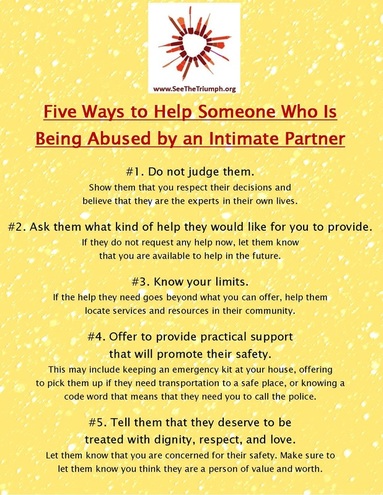|
By Christine Murray, See the Triumph Co-Founder
It sounds simple, doesn’t it? If you’re trying to figure out how to help someone, just ask them what they need. However, when it comes to wanting to help someone you care about who’s involved in an abusive relationship, this question can be difficult to ask for many reasons. You may be afraid of offending them. You may feel like it’d be best to mind your own business. Or, you may have tried to help them in the past, only to have your help not be received in the way you intended. Despite these challenges, an important step you can take to help someone you know who’s being abused is to ask them what types of help and support they could use from you. Be prepared: their answer may surprise you, and it may not be the kind of help that you think they need. For example, you may think they need help leaving the relationship, whereas the help they ask for is for you to babysit their child while they go to a job interview. Of course, it’s up to you if you’ll be able to provide the kind of help that the person asks of you. But, I encourage you to trust their judgment to know what kind of help they need in any given moment. You may not understand how the job interview is connected to their safety, but perhaps they’re seeking that job so that they’ll be better able to survive financially if they ever decide to leave. Sometimes, you may ask how you can help, and the other person will say that they don’t need or want any help from you right now. This can be very frustrating to you, especially if your perspective is that they need a lot of help. If you find yourself wanting to force your help or advice on the person, resist this urge! A much more helpful approach is to let them know that you’ll be there for them if and when they ever do need your help. This leaves the door open for the person to seek your help at another time, and it also avoids disempowering the person by telling them what to do. There are some situations where you may need to take some action to address an abusive relationship situation, even if the person you’re helping doesn’t want you to intervene. These may include the following:
Ultimately, the power of asking what kind of help the person needs lies in trusting their judgment, as well as honoring their choices and expertise to make choices for their own life. This empowerment approach is fundamental to the way that many domestic violence service agencies operate, and it’s useful to adopt in helping a friend as well. Asking how you can help may seem like a simple task, but it requires courage, patience, and compassion. By offering to help in a way that is most meaningful to them, you send a powerful message that their needs and decisions are important, and that help is available if and when they need it.
0 Comments
Leave a Reply. |
Archives
July 2024
CategoriesAll About Intimate Partner Violence About Intimate Partner Violence Advocacy Ambassadors Children Churches College Campuses Cultural Issues Domestic Violence Awareness Month Financial Recovery How To Help A Friend Human Rights Human-rights Immigrants International Media Overcoming Past Abuse Overcoming-past-abuse Parenting Prevention Resources For Survivors Safe Relationships Following Abuse Schools Selfcare Self-care Sexual Assault Sexuality Social Justice Social-justice Stigma Supporting Survivors Survivor Quotes Survivor-quotes Survivor Stories Teen Dating Violence Trafficking Transformative-approaches |
Search by typing & pressing enter



 RSS Feed
RSS Feed